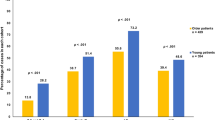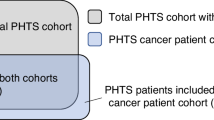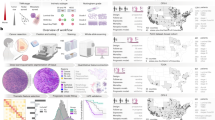Abstract
In a previous report we suggested that the estimation of prothymosin α (PTA) levels in primary breast tumours might be used to identify breast cancer patients at high risk for distant metastasis (Dominguez F et al (1993) Eur J Cancer 29A: 893–897). Here the role of tumour PTA levels as predictor was investigated with respect to both disease-free survival (DFS) and survival. Tumours were obtained from a series of 210 consecutive female patients with ductal carcinoma who underwent surgery at the Hospital Xeral de Galicia (Santiago de Compostela, Spain). Characteristics including PTA tumour levels, number of positive axillary nodes, patient's age at surgery and tumour histological grade were significantly associated with DFS and survival, as determined by univariate analysis. Patients with tumours with low or moderate PTA levels demonstrated a statistically decreased rate of tumour recurrence and a statistically significant increased overall survival in comparison with those whose tumours had high PTA levels. Patient's relative risk of dying was 2.1 times greater for tumours with high PTA levels than for those tumours with low or moderate PTA levels. In conclusion, these data support the hypothesis that tumour high PTA levels is associated with a worse outcome. © 2000 Cancer Research Campaign
Similar content being viewed by others
Article PDF
Change history
16 November 2011
This paper was modified 12 months after initial publication to switch to Creative Commons licence terms, as noted at publication
References
Celis JE, Madsen P and Ryazanov AG (1990) Increased phosphorylation of elongation factor 2 during mitosis in transformed human amnion cells correlates with a decreased rate of protein synthesis. Proc Natl Acad Sci USA 87: 4231–4235
Conteas CN, Mutchnick MG, Palmer KC, Weller FE, Luk GD, Naylor PH, Erdos MR, Goldstein AL, Panneerselvam C and Horecker BL (1990) Cellular levels of thymosin immunoreactive peptides are linked to proliferative events: evidence for a nuclear site of action. Proc Natl Acad Sci USA 87: 3269–3273
Diaz JC, Perez EA, Covelo G and Freire M (1996) Prothymosin alpha binds histones in vitro and shows activity in nucleosome assembly assay. Biochim Biophys Acta 1296: 219–227
Dominguez F, Gallego R, Roson E, Loidi L and Garcia-Caballero T (1997) Prothymosin alpha distribution in normal and tumoral tissues. Int J Thymology 5: 474–476
Dominguez F, Magdalena C, Cancio E, Roson E, Paredes J, Loidi L, Zalvide J, Fraga M, Forteza J and Regueiro BJ (1993) Tissue concentrations of prothymosin alpha: a novel proliferation index of primary breast cancer. Eur J Cancer 29A: 893–897
Eilers M, Schirm S and Bishop JM (1991) The MYC protein activates transcription of the alpha-prothymosin gene. EMBO J 10: 133–141
Eschenfeldt WH and Berger SL (1986) The human prothymosin alpha gene is polymorphic and induced upon growth stimulation: evidence using a cloned cDNA. Proc Natl Acad Sci USA 83: 9403–9407
Fraga M, Garcia CT, Dominguez F, Perez BE, Beiras A and Forteza J (1993) Immunohistochemical location of prothymosin alpha in regenerating human hepatocytes and hepatocellular carcinomas. Virchows Arch A Pathol Anat Histopathol 423: 449–452
Freedman LS, Edwards DN, McConnell EM and Downhay DY (1979) Histological grade and other prognosis factors in relation to survival of patients with breast cancer. Br J Cancer 40: 44–55
Gallego R, Roson E, Garcia CT, Fraga M, Forteza J, Dominguez F and Beiras A (1992) Prothymosin alpha expression in lymph nodes and tonsils: an optical and ultrastructural study. Acta Anat Basel 143: 219–222
Garcia CT, Dominguez F, Roson E, Gallego R, Zalvide J, Forteza J and Beiras A (1994) Distribution of prothymosin alpha in rat and human adrenal cortex. Anat Rec 239: 88–94
Gomez-Marquez J and Rodriguez P (1998) Prothymosin alpha is a chromatin-remodelling protein in mammalian cells. Biochem J 333: 1–3
Gomez MJ and Segade F (1988) Prothymosin alpha is a nuclear protein. FEBS Lett 226: 217–219
Gomez MJ, Segade F, Dosil M, Pichel JG, Bustelo XR and Freire M (1989) The expression of prothymosin alpha gene in T lymphocytes and leukemic lymphoid cells is tied to lymphocyte proliferation. J Biol Chem 264: 8451–8454
Goodall GJ, Dominguez F and Horecker BL (1986) Molecular cloning of cDNA for human prothymosin alpha. Proc Natl Acad Sci USA 83: 8926–8928
Haritos AA, Goodall GJ and Horecker BL (1984) Prothymosin alpha: isolation and properties of the major immunoreactive form of thymosin alpha 1 in rat thymus. Proc Natl Acad Sci USA 81: 1008–1011
Loidi L, Garcia-Caballero T, Vidal A, Zalvide J, Gallego R and Dominguez F (1999) Complex regulation of prothymosin alpha in mammary tumors arising in transgenic mice. Life Sci 64: 2125–2133
Lu KP and Means AR (1993) Regulation of the cell cycle by calcium and calmodulin. Endocr Rev 14: 40–58
Mol PC, Wang RH, Batey DW, Lee LA, Dang CV and Berger SL (1995) Do products of the myc proto-oncogene play a role in transcriptional regulation of the prothymosin alpha gene?. Mol Cell Biol 15: 6999–7009
Papamarcaki T and Tsolas O (1994) Prothymosin alpha binds to histone H1 in vitro. FEBS Lett 345: 71–75
Powles TJ (1997) Adjuvant therapy for early breast cancer: a time to refine. J Natl Cancer Inst 89: 1652–1654
Rodriguez P, Viñuela JE, Alvarez-Fernandez L, Buceta M, Vidal A, Dominguez F and Gomez-Marquez J (1998) Overexpression of prothymosin alpha accelerates proliferation and retards differentiation in HL-60 cells. Biochem J 331: 753–761
Rodriguez P, Vinuela JE, Alvarez-Fernandez L and Gomez-Marquez J (1999) Prothymosin alpha antisense oligonucleotides induce apoptosis in HL-60 cells. Cell Death Differ 6: 3–5
Roson E, Gallego R, Garcia CT, Heimer EP, Felix AM and Dominguez F (1990 a) Prothymosin alpha expression is associated to cell division in rat testis. Histochemistry 94: 597–599
Roson E, Garcia CG, Heimer EP, Felix AM and Dominguez F (1990 b) Cellular distribution of prothymosin alpha and parathymosin in rat thymus and spleen. J Histochem Cytochem 38: 1889–1894
Roson E, Gallego R, Garcia CT, Fraga M, Dominguez F and Beiras A (1993) Evolution of prothymosin alpha and proliferating cell nuclear antigen (PCNA) immunoreactivity through the development of rat ovarian follicles. Histochem J 25: 497–501
Rudolph P, Alm P, Heidebrecht H-J, Bolte H, Ratjen V and Baldetorp B (1999) Immunologic proliferation marker Ki-S2 as prognostic indicator for lymph node-negative breast cancer. J Natl Cancer Inst 91: 271–278
Ryazanov AG (1987) Ca2+/calmodulin-dependent phosphorylation of elongation factor 2. FEBS Lett 214: 331–334
Sburlati AR, Manrow RE and Berger SL (1991) Prothymosin alpha antisense oligomers inhibit myeloma cell division. Proc Natl Acad Sci USA 88: 253–257
Sigurdsson H, Baldetorp B, Borg A, Dlberg M, Fernö M, Killander D and Olsson H (1990) Indicators of prognosis in node-negative breast cancer. N Engl J Med 322: 1045–1053
Tsitsilonis OE, Bekris E, Voutsas IF, Baxevanis CN, Markopoulos C, Papadopoulou SA, Kontzoglou K, Stoeva S, Gogas J, Voelter W and Papamichail M (1998) The prognostic value of alpha-thymosins in breast cancer. Anticancer Res 18: 1501–1508
Vareli K, Tsolas O and Frangou LM (1996) Regulation of prothymosin alpha during the cell cycle. Eur J Biochem 238: 799–806
Vega FV, Vidal A, Hellman U, Wemstedt C and Dominguez F (1998) Prothymosin alpha stimulates Ca2+-dependent phosphorylation of elongation factor 2 in cellular extracts. J Biol Chem 273: 10147–10152
Witzig TE, Ingle JN, Cha SS, Schaid DJ, Tabery RL and Wold LE (1994) DNA ploidy and the percentage of cells in S-phase as prognostic factors for women with lymph node negative breast cancer. Cancer 74: 1752–1761
Zalvide JB, Cancio E, Alvarez CV, Regueiro BJ and Dominguez F (1992) Prothymosin alpha mRNA levels are invariant throughout the cell cycle. J Biol Chem 267: 8692–8695
Author information
Authors and Affiliations
Rights and permissions
From twelve months after its original publication, this work is licensed under the Creative Commons Attribution-NonCommercial-Share Alike 3.0 Unported License. To view a copy of this license, visit http://creativecommons.org/licenses/by-nc-sa/3.0/
About this article
Cite this article
Magdalena, C., Dominguez, F., Loidi, L. et al. Tumour prothymosin alpha content, a potential prognostic marker for primary breast cancer. Br J Cancer 82, 584–590 (2000). https://doi.org/10.1054/bjoc.1999.0968
Received:
Revised:
Accepted:
Published:
Issue date:
DOI: https://doi.org/10.1054/bjoc.1999.0968
Keywords
This article is cited by
-
Gut microbiome disruption altered the biotransformation and liver toxicity of arsenic in mice
Archives of Toxicology (2019)
-
Subcellular dissemination of prothymosin alpha at normal physiology: immunohistochemical vis-a-vis western blotting perspective
BMC Physiology (2016)
-
Prothymosin alpha: a ubiquitous polypeptide with potential use in cancer diagnosis and therapy
Cancer Immunology, Immunotherapy (2012)
-
Transgenic expression of prothymosin alpha on zebrafish epidermal cells promotes proliferation and attenuates UVB-induced apoptosis
Transgenic Research (2010)
-
Transgenic zebrafish line with over-expression of Hedgehog on the skin: a useful tool to screen Hedgehog-inhibiting compounds
Transgenic Research (2009)



